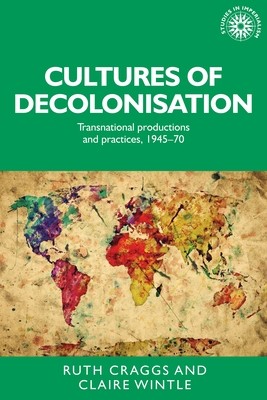
- We will send in 10–14 business days.
- Publisher: Manchester University Press
- ISBN-10: 0719096529
- ISBN-13: 9780719096525
- Format: 15.6 x 23.4 x 2.1 cm, hardcover
- Language: English
- SAVE -10% with code: EXTRA
Cultures of Decolonisation (e-book) (used book) | bookbook.eu
Reviews
Description
What were the distinctive cultures of decolonisation that emerged between 1945 and 1970? What can they tell us about the complexities of the 'end of empire' as a process? How did they reflect and influence the processes of dramatic geopolitical change wrought by the dismantling of European empires? Cultures of decolonisation brings together studies of visual, literary and material cultures to explore these questions. The collection illustrates the value of engaging with the complexities of decolonisation, as enacted and experienced by a broad range of actors beyond 'flag independence' and the realm of high politics. In doing so it makes an important contribution to the diversification of the historiography of the end of empire. A range of disciplinary perspectives are included, with individual chapters focusing on architecture, theatre, museums, heritage sites, fine art and interior design alongside institutions such as artists' groups, language agencies and the Royal Mint, in Africa, Asia, the Caribbean and Europe. The contributions reveal the diverse ways in which cultures were active in wider political, economic and social change, working as crucial gauges, microcosms and agents of decolonisation. They demonstrate the transnational character of decolonisation and its cultures, thereby illustrating the value of comparison - between different sorts of cultural forms and different geographical locations - in understanding the nature of this dramatic and wide-reaching geopolitical process. This collection will appeal to students and lecturers in imperial history and researchers of decolonisation at all levels across the humanities and social sciences.
EXTRA 10 % discount with code: EXTRA
The promotion ends in 7d.18:50:40
The discount code is valid when purchasing from 10 €. Discounts do not stack.
- Publisher: Manchester University Press
- ISBN-10: 0719096529
- ISBN-13: 9780719096525
- Format: 15.6 x 23.4 x 2.1 cm, hardcover
- Language: English English
What were the distinctive cultures of decolonisation that emerged between 1945 and 1970? What can they tell us about the complexities of the 'end of empire' as a process? How did they reflect and influence the processes of dramatic geopolitical change wrought by the dismantling of European empires? Cultures of decolonisation brings together studies of visual, literary and material cultures to explore these questions. The collection illustrates the value of engaging with the complexities of decolonisation, as enacted and experienced by a broad range of actors beyond 'flag independence' and the realm of high politics. In doing so it makes an important contribution to the diversification of the historiography of the end of empire. A range of disciplinary perspectives are included, with individual chapters focusing on architecture, theatre, museums, heritage sites, fine art and interior design alongside institutions such as artists' groups, language agencies and the Royal Mint, in Africa, Asia, the Caribbean and Europe. The contributions reveal the diverse ways in which cultures were active in wider political, economic and social change, working as crucial gauges, microcosms and agents of decolonisation. They demonstrate the transnational character of decolonisation and its cultures, thereby illustrating the value of comparison - between different sorts of cultural forms and different geographical locations - in understanding the nature of this dramatic and wide-reaching geopolitical process. This collection will appeal to students and lecturers in imperial history and researchers of decolonisation at all levels across the humanities and social sciences.


Reviews